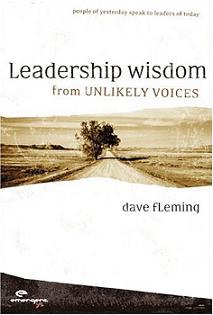
It was a relative downtime in my life when I received a copy of
Leadership Wisdom from Unlikely Voices by Dave Fleming (copyright 2004, Youth Specialties) in the mail. I didn't see myself in leadership at all, and as we were looking to find a church in which to be comfortable and to feel challenged, I really didn't want to contemplate that side of my Christian life for a long while. Show of hands if you know God often has other plans?
I've read my share of leadership books and church growth books and how-to-do-youth-ministry books and how-to-lead-small-groups books and rediscover-your-heart-to-be-a-better-leader books. But Fleming has written something here that I hadn't come across before: a book that "agreed" with some of the things I'd already experienced, but that also expanded on the truths I'd come to hold dear and even exploded some of the things I needed to let go. Too often we read books that agree with us, feeling very confident that we would say the same things as the author if we had access to his thesaurus. With Fleming in
Leadership Voices, he was saying what I would say if I knew what the heck I was talking about, which was becoming less and less apparent as his book became more and more challenging and more and more encouraging for me personally. I don't know if that translates well in text on a screen: basically, I knew some of this stuff, but I didn't understand it, and what I didn't know or didn't have before, I've been challenged there, too.
In the Introduction, "You Lead What You Eat", I think the author gives the reader a thesis statement for why this book was written:
At this juncture in leadership thought and practice, we need uncommon lenses to view a domain that has grown too predictable. This book provides just such a view of leadership thought and practice - and that's through the lens of the Unlikely. The Unlikely, in this case, are men and women of the past whose lives and messages left an indelible mark on the world. Most would not be required reading for contemporary leadership classes. Nevertheless, they provide us with wisdom for the terrain of 21st-century leadership. (p. 15)
In sharing "unlikely voices", Fleming shows that these ideas are not new, they are "tried", and they have already given return on investment and results that are meaningful in their particular cultures.
This book works through Fleming's use of popular culture to point out its faults - imagery and plotpoints from
Castaway, recollections of watching
The Wild, Wild West as a kid, comparing parallel life circumstances to living in the Twilight Zone (I am so there!) - and his use of comparatively "unpopular" culture to hear the voices and lives of people who have never really been heard as "leadership voices" before. The question one might have is, "if these people had such leadership insights, why haven't we heard some of these things before?", or, "why did Fleming have to scrape the barrel to find such off-the-wall references to say what he ultimately wanted to say?". I would respond that what's provided here is common sense, and in using voices and lives and examples that have never really been used in this context before, Fleming is able to point out the obvious in a way that... well, if it had been obvious before we would've been doing that already.
In comparing our leadership needs to tending a flame, I'm challenged by the idea of both cultivating that environment necessary for the fire to grow and to be helpful, and to surrender to the flame's unpredictability in order for it to grow and maintain its usefulness. In embracing aspects of chaos that have been the bane of leadership books and seminars for the past several decades - "Can you say five-year plan? Come on! Five years? If you must, go ahead, but around month seven of year one, get ready for a bend in the road that could change everything" (p. 27) - we find a "friend" that keeps us on our toes and encourages visionary dreaming and working out those details for the future growth of our organizations. Ideas and issues such as these need a new voice, a new askew perspective to get my mind around the whole, and Fleming's book has done just that for me. So if you see me looking at something funny, head slightly cocked to the right, in deep deep thought, just consider this: I'm listening for an unlikely voice, a still breeze instead of the earthquakes and the fire, to speak into my life and bring direction, encouragement and grace.
The Unlikely Voices you discover - past and present, resonant and dissonant - are part of a mighty chorus of Voices. These Voices seek to live and to provide leadership that begins from a place of authenticity. Let these voices rush into you like a mighty stream of humanity sharing its heart with you. Then join them. Live and lead in a way that creates in you a Voice - an unlikely Voice, a Voice that will inspire others to find their own voices. (p. 193)
That's what stands out to me most, probably. In a world that wants to quote the latest slogan or live out the latest NYT Bestseller title, these "unlikely voices" are a clarion call to have your own voice and your own life be heard.





 We fly out this afternoon for the return trip to CAE. Wish us the best: there's bad weather north of Charlotte, sleet and snow and stuff there, while it's sunny and 81F here right now in San Juan. I've got a photo from my balcony this morning, and I'll put it together with a snapshot of falling wintery precipitation if I see any before I get home - "here's morning, here's evening". I'm looking forward to seeing the kids, sleeping in my own bed, being with my sweetie again.
We fly out this afternoon for the return trip to CAE. Wish us the best: there's bad weather north of Charlotte, sleet and snow and stuff there, while it's sunny and 81F here right now in San Juan. I've got a photo from my balcony this morning, and I'll put it together with a snapshot of falling wintery precipitation if I see any before I get home - "here's morning, here's evening". I'm looking forward to seeing the kids, sleeping in my own bed, being with my sweetie again.